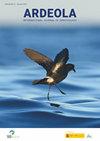用两种通用引物对一种鸦科鸣禽进行快速低成本的分子性别鉴定
IF 1.2
4区 生物学
Q2 ORNITHOLOGY
引用次数: 2
摘要
总结。在许多鸟类物种中,性别二态性的缺失使直接观察的性别决定变得复杂,阻碍了性别特异性研究。分子性别鉴定的标准方案包括染色体结构域解旋酶dna结合蛋白1 (CHD1)基因内含子区域的聚合酶链反应(PCR)扩增。虽然已经研究了几种方法,但它们对鸣禽(雀形目)的有用性并不一致,并且在很大程度上取决于目标物种和耗时的引物集特定优化可用协议。本文采用P2/P8和2550F/2718R两组通用引物对一种鸦科鸣禽——长毛冠Jay Cyanocorax chrysops进行分子性别鉴定。该方案快速、廉价且非常有效。使用2550F/2718R,在0.8%琼脂糖凝胶上,通过两条相距约200个碱基对(bp)的条带显示雌性。相反,P2/P8雌性扩增子相差约30 bp,需要更昂贵的3%琼脂糖凝胶才能显示它们。我们的结果是背景与最新的文献调查分子性别在其他鸦。2550F/2718R引物组是有效的,为松鸦和其他鸟类的性别鉴定提供了一种可靠和低成本的方法。- louis - milevicich, J., Gómez, r.o., Ursino, c.a., Lois, N.A.和de la Colina, A.(2021)。用两组通用引物对一种鸦科鸣禽进行快速、低成本的分子性别鉴定。中国生物医学工程学报,28(6):501-510。本文章由计算机程序翻译,如有差异,请以英文原文为准。
Rapid and Low-Cost Molecular Sexing of a Corvid Songbird Using a Single Protocol with Two Universal Primer Sets
Summary. The absence of sex dimorphism in many bird species complicates sex determination by direct observation, hindering sex-specific studies. Standard protocols for molecular sexing include polymerase chain reaction (PCR) amplification of intron regions of the Chromodomain-Helicase DNA-binding protein 1 (CHD1) gene. While several methods have been studied, their usefulness for songbirds (Passeriformes) has not been consistent and has largely depended on target species and on time-consuming primer-set specific optimisation of available protocols. We tested a molecular sexing protocol with two universal primer sets (P2/P8 and 2550F/2718R) in a corvid songbird: the Plush-crested Jay Cyanocorax chrysops. The protocol was rapid and inexpensive as well as highly effective. Using 2550F/2718R, females were revealed by two bands separated for some 200 base pairs (bp) that resolved easily on 0.8% agarose gel. Conversely, P2/P8 female amplicons differed in roughly 30 bp and a more expensive 3% agarose gel was necessary to reveal them. Our results are contextualised with an up-to-date literature survey of molecular sexing in other corvids. The primer set 2550F/2718R is found to be effective, providing a reliable and low-cost method for sexing jays and other corvids. —Lois-Milevicich, J., Gómez, R.O., Ursino, C.A., Lois, N.A. & de la Colina, A. (2021). Rapid and low-cost molecular sexing of a corvid songbird using a single protocol with two universal primer sets. Ardeola, 68: 501-510.
求助全文
通过发布文献求助,成功后即可免费获取论文全文。
去求助
来源期刊
CiteScore
2.30
自引率
6.20%
发文量
16
审稿时长
>12 weeks
期刊介绍:
Ardeola: International Journal of Ornithology is the scientific journal of SEO/BirdLife, the Spanish Ornithological Society. The journal had a regional focus when it was first published, in 1954. Since then, and particular during the past two decades, the journal has expanded its thematic and geographical scope. It is now a fully international forum for research on all aspects of ornithology. We thus welcome studies within the fields of basic biology, ecology, behaviour, conservation and biogeography, especially those arising from hypothesis-based research. Although we have a long publication history of Mediterranean and Neotropical studies, we accept papers on investigations worldwide.
Each volume of Ardeola has two parts, published annually in January and July. The main body of each issue comprises full-length original articles (Papersand Review articles) and shorter notes on methodology or stimulating findings (Short Communications). The publication language is English, with summaries, figure legends and table captions also in Spanish. Ardeolaalso publishes critical Book Reviewsand PhD-Dissertation Summaries; summarising ornithological theses defended in Spain. Finally there are two Spanish-language sections, Ornithological News; summarising significant recent observations of birds in Spain, and Observations of Rare Birds in Spain, the annual reports of the Spanish Rarities Committee.

 求助内容:
求助内容: 应助结果提醒方式:
应助结果提醒方式:


